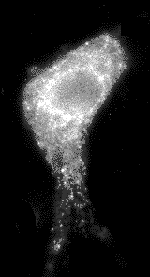 | Gulf War Veterans Twice as Likely to Suffer from ALS |
 | Gulf War Veterans Twice as Likely to Suffer from ALS |
|
By Ellen Kuwana Neuroscience for Kids Staff Writer January 10, 2002
The one-year epidemiological* study, one of the largest ever done, assessed the health of approximately 700,000 Gulf War veterans and 1.8 million veterans who were not sent to the Persian Gulf. All of the veterans who participated in the study were on active duty between August 2, 1990 and July 31, 1991. (*Epidemiology: a branch of medical science that deals with the incidence, distribution, and control of disease in a population.) |
|
The study found 40 cases of ALS in the 700,000
Gulf War veterans. This is the equivalent of a one in
17,500 chance of getting ALS; expressed in another way, there were
57 cases of ALS per million people. In the group of 1.8 million veterans
who were not in the Gulf War, 67 cases of ALS were identified. This
is equivalent to a one in 26,866 chance of getting
ALS; expressed in another way there were 37 cases of ALS per million
people. Interestingly, veterans from the four branches of the military
were not equal in their risk. Air Force veterans were 2.7 times more
likely to develop ALS and Army veterans were twice as likely to get ALS
compared to veterans who were not in the Gulf War. Navy and Marine
personnel were at no greater risk of developing ALS than non-Gulf War
veterans. The study is preliminary and has not been reviewed by other
scientists, but the government has promised to provide disability and
survivor benefits to affected families immediately. The study discussed in this article is an epidemiological study, meaning that it focuses on understanding the pattern of the incidence of diseases, rather than possible causes. The next step is to analyze DNA from the affected veterans to obtain genetic information. ALS is rare in people under 45 years of age; this makes the cases of ALS in veterans in their 40s of special interest. Perhaps these cases will provide a clue as to what triggers the development of ALS. The study also marks the first official acknowledgment by the US government of a particular disorder being linked to Operation Desert Storm. Many veterans have complained of symptoms ranging from chronic fatigue to memory loss since returning from the Gulf War. These symptoms are known collectively as "Gulf War Syndrome." A federally funded epidemiological study (Kang et al. 2001) completed in October 2001 compared the children of 15,000 Gulf War veterans with children of 15,000 veterans who were not in the Gulf War. This study found that the children of Gulf War veterans were two- to three-times more likely to be born with birth defects than other veterans' children. |  Cell body of a motor neuron in the spinal cord. |
| Did You Know? | In the US, approximately 5,000 people each year are diagnosed with ALS. |
|
References:
|
| GO TO: | Neuroscience In The News | Explore the Nervous System | Table of Contents |
![[email]](./gif/menue.gif) Send E-mail |
 Fill out survey |
 Get Newsletter |
 Search Pages |
 Take Notes |